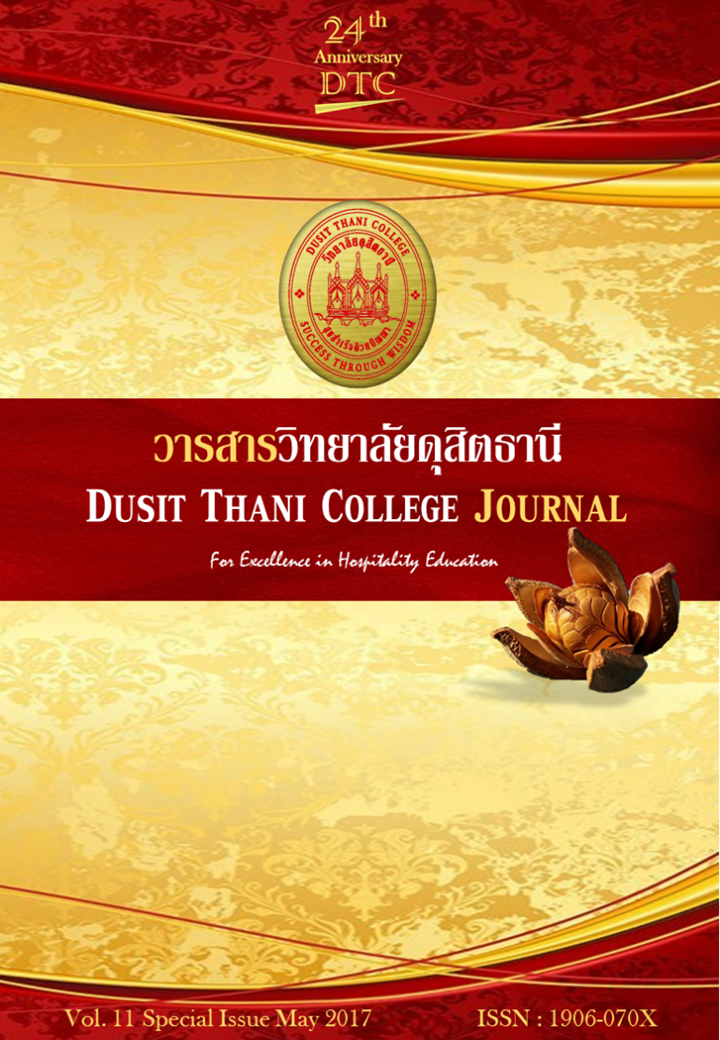รูปแบบและกลยุทธ์การดำเนินธุรกิจค้าปลีกอาหารฮาลาล : กรณีศึกษาเขตกรุงเทพมหานคร
Main Article Content
บทคัดย่อ
การวิจัยรูปแบบและกลยุทธ์การดำเนินธุรกิจค้าปลีกอาหารฮาลาล : กรณีศึกษาเขตกรุงเทพมหานคร มีวัตถุประสงค์ 1) เพื่อศึกษารูปแบบและกลยุทธ์การดําเนินธุรกิจค้าปลีกอาหารฮาลาล ในเขตกรุงเทพมหานคร 2) เพื่อศึกษาถึงกลยุทธ์การตลาดของธุรกิจร้านค้าปลีกอาหารฮาลาล ในเขตกรุงเทพมหานคร โดยกลุ่มตัวอย่างประกอบอาชีพค้าปลีกอาหารฮาลาลในเขตกรุงเทพมหานคร 20 ราย
สรุปข้อค้นพบ
1) รูปแบบและกลยุทธ์การดําเนินธุรกิจค้าปลีกอาหารฮาลาลซึ่งประกอบด้วย ประเภทปรุงสุก ประเภทอาหารสด และประเภทอาหารที่มีตราฮาลาล ซึ่งผลิตภัณฑ์อาหารแต่ละประเภทมีส่วนประสมทางการตลาดที่แตกต่างกัน เมื่อวิเคราะห์การตลาดพบว่า ผลิตภัณฑ์อาหารฮาลาลมีจุดเด่นในเรื่องของผลิตภัณฑ์ที่สะอาดเข้าถึงกลุ่มลูกค้าที่มีลักษณะเฉพาะได้เป็นอย่างดี เนื่องจากเข้าใจและรู้จักพฤติกรรมผู้บริโภค เนื่องจากตั้งร้านอยู่ในเขตชุมชนที่มีกลุ่มลูกค้าที่เป็นชาวมุสลิม แต่ผลิตภัณฑ์ยังไม่มีความหลากหลาย รวมทั้งยังต้องมีการพัฒนาในเรื่องคุณค่าทางโภชนาการ รสชาติ และบรรจุภัณฑ์ เพื่อยกระดับผลิตภัณฑ์ให้ไปสู่ตลาดที่มีกลุ่มลูกค้าที่กว้างมากขึ้น และ
2) การศึกษากลยุทธ์ทางการตลาดของธุรกิจค้าปลีกอาหารฮาลาล โดยการวิเคราะห์ STP เพื่อเป็นข้อมูลสำหรับการวางแผนกลยุทธ์การตลาด พบว่า สินค้าอาหารฮาลาลแบ่งการตลาดออกเป็น 3 กลุ่มคือ กลุ่มลูกค้าในชุมชน กลุ่มลูกค้าทั่วไป และกลุ่มลูกค้าเฉพาะ ซึ่งในการกำหนดเป้าหมายและตำแหน่งทางการตลาดจะแตกต่างกันกล่าวคือ กลุ่มลูกค้าในชุมชนจะกำหนดตำแหน่งสินค้าในราคาที่ค่อนข้างถูก กลุ่มลูกค้าทั่วไปจะกำหนดราคาโดยอิงตามเกณฑ์ราคาตลาด และกลุ่มลูกค้าเฉพาะจะกำหนดราคาไว้สูง เนื่องจากเป็นสินค้าที่เป็นกลุ่มเฉพาะและมีความอ่อนไหวง่าย มีความเสี่ยงที่คนจะไม่ซื้อได้
Article Details
นโยบายการพิจารณากลั่นกรองบทความ
- บทความวิจัยและบทความวิชาการทุกเรื่องที่จะได้รับการตีพิมพ์ต้องผ่านการพิจารณากลั่นกรองโดยผู้ทรงคุณวุฒิ (Peer Review) ในสาขาที่เกี่ยวข้อง จำนวน 3 ท่าน/บทความ
- บทความ ข้อความ ภาพประกอบและตารางประกอบที่ลงตีพิมพ์ในวารสารเป็นความคิดเห็นส่วนตัวของผู้เขียน กองบรรณาธิการไม่จำเป็นต้องเห็นด้วยเสมอไป และไม่มีส่วนรับผิดชอบใด ๆ ถือเป็นความรับผิดชอบของผู้เขียนแต่เพียงผู้เดียว
- บทความที่จะได้รับการตีพิมพ์จะต้องไม่เคยตีพิมพ์ เผยแพร่ที่ใดมาก่อน และไม่อยู่ระหว่างการพิจารณาของวารสารฉบับอื่น หากตรวจสอบพบว่ามีการตีพิมพ์ซ้ำซ้อน ถือเป็นความรับผิดชอบของผู้เขียนแต่เพียงผู้เดียว
- บทความใดที่ผู้อ่านเห็นว่าได้มีการลอกเลียนหรือแอบอ้างโดยปราศจากการอ้างอิง หรือทำให้เข้าใจผิดว่าเป็นผลงานของผู้เขียน กรุณาแจ้งให้กองบรรณาธิการวารสารทราบจะเป็นพระคุณยิ่ง
เอกสารอ้างอิง
Amonrat Sinviriyakul. (2004). Factors Affecting Decision to Buy Stainless Steel Products in Bangkok Metropolitan. Thesis (Markrting) . (in Thai)
Benjapha Meepradij. (2011). Consumer expectations and perceptions on the quality of biotech dishwashing products from bergamot from consumers in Chonburi Province. Thesis, Burapha University. . (in Thai)
Chai Phositha. (2011). The science and art of qualitative research. NakhonPrathom: PimLuk.
Halal Institute, Prince of Songkla University. (2015). International Seminar Halal science. “WORLD HAPEX 2015” Retrieved May 2, 2016, form www.halinst.psu.ac.th. . (in Thai)
Kotler, P., & Armstrong, G. (1997). Marketing: An introduction. Upper Saddle River,New Jersey:
Prentice- Hall.
Kasikornthai research. (2016). Thailand's Economic and Business for 2016. Retrieved June 12, 2016, form http://www.kasikornbank.com. . (in Thai)
Mit Chunim. (2006). Marketing factors affecting decision to buy processed food. Thesis Phranakhon Rajabhat University. . (in Thai)
Nupaspat Sutithom.(2003). Consumer attitude towards retail store in Muenag, district,
Samut Sakhon province. Special Study, Chiang Mai: Chiang Mai University. (in Thai)
Piboon Theepaparn. (2003). Strategic Management. Bangkok: Amonprinting. . (in Thai)
Tawarit Nikorntat. (2002). Factors influencing shop choice. Consumer Convenience.
Special Study, Mahasarakham: Mahasarakham University. . (in Thai)
Thiti wonginta. (2015). Value Chain Analysis of Halal Food. Journal of Transportation and
Logistics, 8, 1-11. (in Thai)
Wutisak Pitsuwan. (2005). Factors Affecting the Level of Significance given to the Halal Logo by Muslim Consumers in Making Purchase Decisions on Food Products: A Case Study of the Thai Muslims Living in the Four Most Southern Provinces. Retrieved June 25,
form http://www.bu.ac.th/knowledgecenter/epaper/jan_june2005/wutisak.pdf (in Thai)


